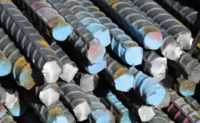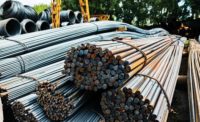Seeking to revive U.S. steel and aluminum industries that he says have been "ravaged" by low-price imports, President Trump has approved tough tariffs on shipments of those products from all countries except—at least for now—Canada and Mexico.
Steel industry officials praised the 25% tariffs on steel and 10% on aluminum that were approved March 8. But construction industry officials and heavy-equipment makers warned that the import fees will drive up costs of products used in projects they build or equipment they manufacture.
(View texts of presidential proclamations on steel and aluminum.)
Stephen E. Sandherr, Associated General Contractors of America's CEO, said in a statement, "These new tariffs will cause significant harm to the nation's construction industry, put tens of thousands of high-paying construction jobs at risk, undermine the president's proposed infrastructure initiative and potentially dampen demand for new construction projects for years to come."
Dennis Slater, Association of Equipment Manufacturers president, said the industry "is profoundly disappointed" by Trump's tariff decision. Slater noted that steel accounts for about 10% of heavy-equipment makers' direct costs and said steel prices have already gone up because of expectations that the tariffs would be coming.
He added, "These Trump tariffs will put U.S. equipment manufacturers at a competitive disadvantage, risk undoing the strides our economy has made due to tax reform and ultimately pose a threat to American workers' jobs."
Goal: Protecting Workers, Companies
Trump made clear he wants to safeguard an industry that has lost ground. He said, "The American steel and aluminum industry has been ravaged by aggressive foreign trade practices. It's really an assault on our country."
He said the administration wants to have steel imports, "but we want it to be fair." Trump added, "And we want our workers to be protected. And we want, frankly, our companies to be protected."
Trump had said earlier that the tariffs would apply to all countries, but the final version exempts steel and aluminum from Canada and Mexico, at least temporarily. The decision hinges on whether or not the two countries and the U.S. can reach agreement on a revised North American Free Trade Agreement (NAFTA), the president said.
Trump said that "due to the unique nature of our relationship" with Canada and Mexico, he would hold off on tariffs "to see whether or not we're able to make the deal on NAFTA. … If we don't make the deal on NAFTA, and if we terminate NAFTA … we'll start all over again."
He added, "But I have a feeling we're going to make a deal on NAFTA. And if we do, there won't be any tariffs on Canada and there won't be any tariffs on Mexico."
The directives also provide a way for other countries to avoid the tariffs. Trump said that "America will remain open to modifying or removing the tariffs for individual nations as long as we can agree on a way to ensure that their products no longer threaten our security."
U.S. Trade Representative Robert Lighthizer will be in charge of such negotiations regarding an "alternative" to the tariffs, the president said.
GOP Lawmakers Oppose New Tariffs
Leading congressional Republicans criticized Trump's actions, contending that they would boost steel and aluminum costs to manufacturers and prompt retaliatory penalties on U.S. shipments to tariff-targeted countries.
House Speaker Paul Ryan (R-Wis.) said in a statement, "I disagree with this action and fear its unintended consequences." Ryan welcomed the exemptions for some countries, but added, "We will continue to urge the administration to narrow this policy so that it is focused only on those countries and practices that violate trade law."
Sen. Jeff Flake (R-Ariz.) also slammed the tariff decision and said he would draft proposed legislation to "nullify" the action.
A senior administration official, briefing reporters before Trump signed the tariff orders, dismissed predictions that they would lead to higher costs. He said, "There will be no significant price effects or inflationary effects or jobs effects downstream from the steel and aluminum industries. This is simply fake news."
He characterized the tariffs as "modest, targeted and balanced." He said the new levies would raise the cost of a six-pack of soda or beer by only 1.5¢ to 2¢ and the price of a $330-million Boeing 777 aircraft by $25,000, or less than 0.001%.
The official didn't offer any construction-related examples.




Post a comment to this article
Report Abusive Comment